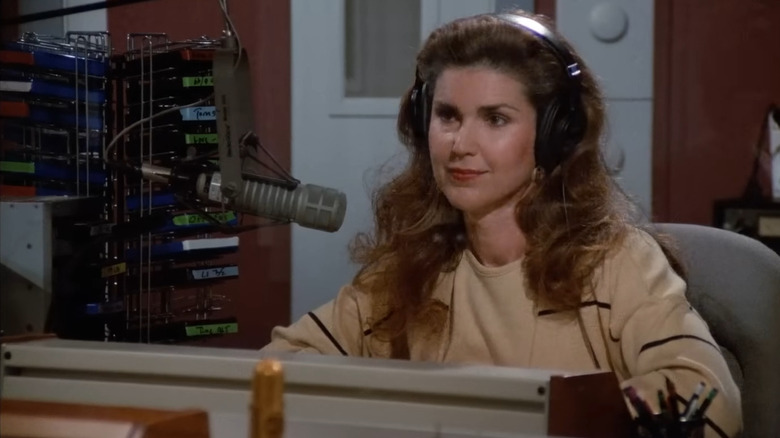Frasier: Is Roz's Story About Lupe Velez True?
"Frasier" tends to traffic in tall tales, though usually they come from the grandiose notions bandied about by its titular hero (Kelsey Grammer). A memorable moment when someone else's exploits become a topic of conversation occurs in the show's very first episode, "The Good Son." In it, Roz Doyle (Peri Gilpin) tries to comfort a stressed-out Frasier by telling him the story of Lupe Vélez, an actress whose dying career inspires her to exit the world in a splashy fashion. Her carefully composed final scene is ruined when the pills she swallows combine with the dinner she ate. Rushing to the bathroom, Vélez plunges headfirst into her toilet, where she drowns. Frasier asks Roz why she's sharing this story with him, and she reasons that Vélez always wanted to be remembered — and thus, in a twisted way, her wish has been granted, even though it — like Frasier's own life — didn't work out as she planned it.
This tale sounds outrageous enough to be true, but it is not. The urban legend Roz recounts about Vélez stems from the notoriously unreliable book "Hollywood Babylon," penned by seminal underground filmmaker Kenneth Anger. As a matter of fact, Roz's version of the story doesn't even reflect Anger's slightly more sympathetic take on Vélez's suicide, in which she acts out of pure shame when she learns that the father of her unborn child, Harald Ramond, faked a desire to marry her via the delivery of a prenuptial agreement. Deciding against an abortion due to her strict religious upbringing, Vélez instead chooses suicide, with the same results described by Roz.
The truth of Vélez's suicide is much more complicated — and "Frasier" isn't the only legendary '90s sitcom that has referenced her tragic life.
Frasier isn't the only series which embraced this myth
Lupe Vélez is likely a familiar name to sitcom fans who grew up in the '90s, as "Frasier" isn't the only show to make a reference to the urban legend connected to her death. In "The Simpsons" episode "Homer's Phobia," John (John Waters) takes the family on a tour of Springfield's most "ludicrously tragic" places. During it, he points out the store where Vélez allegedly bought the toilet she drowned in, to their delight.
In reality, Vélez's career wasn't faltering when she passed away. The circumstances behind her suicide continue to be a topic of debate — biographer Michelle Vogel believes Vélez had untreated bipolar disorder. She also may have despaired when her attempt at convincing Ramond to marry her for love failed, whether or not he was the biological father of her child, a topic that has also been posthumously debated. But whatever the reason for her choice, the actress was actually found at the scene of her death just as she wished to be — calmly composed and in bed. This was confirmed when The Huffington Post ran rediscovered crime scene photos in 2013. Vogel has also pointed out that the pill Vélez took, Seconal, was a highly powerful barbiturate, and an overdose the magnitude of which Vélez took would have rendered her dead within a matter of minutes.
Hopefully, future audiences will rediscover Vélez's prodigious comedic gifts through her films, which continue to shine decades after Anger's book got the ball rolling on an urban legend that refuses to flicker out, no matter how untrue it is.
If you or someone you know is struggling or in crisis, help is available. Call or text 988 or chat 988lifeline.org

